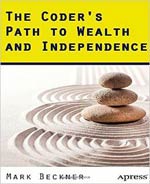If you’re in the programming trenches and you dream of climbing out, take heart: According to one coder-turned-entrepreneur, there’s actually a way for programmers to make it big by venturing out on their own. He even wrote a book to show you the way.
The book is “The Coder’s Path to Wealth and Independence,” by Mark Beckner, a business integration consultant and principal at Inotek Consulting Group in Grand Junction, Colo. In a recent email interview, I got a first-hand account of Beckner’s own journey from coder to entrepreneur, and of what he wanted to convey in his book. I started by asking him what the biggest mistake was that he had made in his own transition. He said it was taking too long to realize what was possible:
My early years, like with so many developers and consultants, were spent on the road. I have a deep dislike of being on the road for the sake of filling a seat. The gross waste in time, energy, and resources is, unfortunately, an acceptable norm for many consultants and independent contractors. The mindset is to go where the work is, and do what is necessary to get there. When it is early in your career, there is nothing wrong with this – you have to do your time, and gain the appropriate experience. But no one after a certain number of years in the industry should be getting on a plane every week to sit in a cubicle for 40 hours.
Beckner went on to say that every mistake he makes is due to experimentation:
Because I work alone, and am pushing the envelope on what is possible with an independent practice, I don’t have the opportunity to pattern myself after what other people are doing, or brainstorm with others about running my business. I have to experiment to find out what works and what doesn’t. Some of these experiments have been very costly, and some take a lot of time and energy. When they don’t work the way I expect them to, I don’t look at it as a major setback. I look at it as the cost of learning. Having learned from these, I can help others avoid them. Mentors in my mentorship programs are paying for this experimentation – they learn what has worked for me and how to avoid these same mistakes, which can save them a great deal of time and expense in their own quests for success.

My first technology-related job was in technical support. I had to answer calls throughout the day from people who were having issues connecting to the Internet. I was terrified of using the phone. I broke out in a sweat every time I had to pick one up. Now, I have done millions of dollars of business over the phone. I overcame my nature, or my personality, and learned a skill that allowed me to grow. If I had never accepted a job that forced me to change, I would still be washing dishes in a restaurant like I did in college.
Beckner explained that most successful people weren’t born with the traits that made them successful:
Virtually everything we do is learned. Our personalities are often used as excuses to cover for our lack of experience or abilities. Without doubt, many coders are introverted and often feel as if they could never sell, and have no interest in mastering communication – written or verbal. All of the standard excuses are used. ‘I am not a salesperson’ is a common refrain. What people don’t realize is that most people who are successful weren’t born with the traits that made them so. You aren’t comfortable speaking in front of groups because you haven’t practiced it, not because of a personality trait. You aren’t comfortable with sales, because you aren’t comfortable discussing money, or you aren’t comfortable talking about what you can do for a client, not because you aren’t a natural salesperson. You have to push yourself into uncomfortable situations in order to learn new things and master new skills. Only by constantly pushing yourself will you find out what you are capable of, and operate at your highest potential.
I asked Beckner in what sense his book is specific to coders. His response:
I am a coder who learned the skills needed to become successful in business. I’ve taken all of my experience and have laid it out in this book. I don’t like my time to be wasted, and I don’t waste other people’s time. I’ve packed a huge amount of detail and value into as concise a book as possible. There are very specific topics relevant to coders, especially as they relate to travel, skill acquisition, ethics, advertising, sales, and fee setting. Developers are working in an industry where there is immense opportunity. You can sit behind your computer every day and make a few hundred bucks working for someone, and not be in control of your life, or you can work for yourself, make thousands, and have your freedom. This book outlines how anyone with programming skills and the appropriate desire can create a highly successful independent practice. It isn’t something that has to take years. In most cases, you are sitting on a goldmine that is waiting to be discovered and mined. The book outlines the steps necessary to unlock this goldmine and move forward in a rapid fashion toward true wealth and freedom.
So who, other than coders, would benefit from reading his book? Beckner said it actually has wide applicability:
The principles covered in the book are applicable to anyone who wants to run their own business and has aspirations of wealth and independence. The book is primarily geared toward solo practices, but there are topics that would be of interest to any entrepreneur. Learning to set goals and execute successfully on those goals has an inordinate effect on your business. Having a mentality of abundance and generosity will open opportunities and avenues for revenue in any business that you are running yourself. Understanding the nature of business, and how to harness and leverage the energy to attain success, are indispensable for self-made success. If you are in business for yourself or are planning on being independent – whether you are a developer or not – the sections on goal-setting and wealth utilization will prove to be indispensable to you.
I asked Beckner to single out the most important takeaway that he wants readers to get from the book. He said it’s the understanding that you’re capable of far more than you can imagine, both professionally and personally:
Your actions and your mindset have immense influence over how successful you will be in business. There are very tangible and concrete steps that need to be taken to lay the foundation for a successful business, and to open up channels for profitable work to find you. But there are also very ethereal, metaphysical steps that must be taken in order to attain what is truly possible. Business is often looked at as something that is all about cash. The truth is that when running your own independent business, it becomes a reflection of who you are and how you perceive and interact with the world. Your success in business will influence how valuable you are to the world around you, and, in turn, the way you interact with your world will influence the types of opportunities that make themselves available to you professionally.
A contributing writer on IT management and career topics with IT Business Edge since 2009, Don Tennant began his technology journalism career in 1990 in Hong Kong, where he served as editor of the Hong Kong edition of Computerworld. After returning to the U.S. in 2000, he became Editor in Chief of the U.S. edition of Computerworld, and later assumed the editorial directorship of Computerworld and InfoWorld. Don was presented with the 2007 Timothy White Award for Editorial Integrity by American Business Media, and he is a recipient of the Jesse H. Neal National Business Journalism Award for editorial excellence in news coverage. Follow him on Twitter @dontennant.



